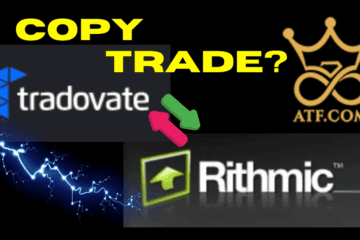Whether you have burnt money on prop firms that you haven’t passed, or threw good money after bad in a personal trading account, this guide outlines the key differences between a prop firm and personal trading accounts and which one might be better (depending on your trading).
Prop Firms Overview Pros and Cons
For prop firms, you need to be able to pass the challenge and verification phases to get any value out of them.
This means hitting a target before hitting a drawdown, sometimes on 2 accounts before you get a shot at the real deal.
There are also other rules to contend with along the way.
IF you can confidently pass over a series of challenges (say 3 out of 5) and expect a certain return once you have a funded account, you can basically reverse engineer your value and compare that to a personal account balance of the same dollar value as the cost of getting funded.
Personal Trading Overview Pros and Cons
Personal trading accounts are more flexible than prop firm accounts because they aren’t governed by strict rules and drawdown limits.
For those willing to test and trial their strategy on a small live balance, this can ensure the risk and reward settings are stacked before forking out for challenges.
The cost of testing can be reduced heavily to ensure you are hitting your targets (that would pass a challenge) without reaching drawdown limits. This can be achieved by trading with say, 100 instead of 100,000 on relative lots sizes to determine outcomes on small amounts of money.
You can build up history over the long term, rather than by each challenge and then have to start again with your history buildup.
If your strategy doesn’t suit the rules of prop firms due to drawdown limits etc. then a personal trading account may be a more flexible way to trade your system. There are plenty of strategies that don’t work well with prop firms due to drawdowns or holding periods.
Choosing between trading with a proprietary (prop) firm and using personal funds is a major decision for any trader. Each approach has its own benefits and challenges, making it crucial to understand which one aligns with your goals, risk tolerance, and trading style.
In this guide, we’ll break down the key differences between prop firm trading and personal trading to help you make an informed decision.
What Is Prop Firm Trading?
Prop firms provide traders with access to large amounts of capital in exchange for a profit split. Traders must typically pass an evaluation process to prove their skills before receiving funded accounts. Some of the most well-known prop firms include FTMO, My Forex Funds, and The5ers.
What Is Personal Trading?
Personal trading involves using your own capital to trade in the markets. You have full control over your strategy, risk management, and profits, but you also bear 100% of the financial risk.
Key Differences Between Prop Firm and Personal Trading
1. Capital Access
- Prop Firm: Provides access to large accounts (often ranging from $10,000 to $500,000+).
- Personal Trading: Requires funding your own account, which may limit position sizes.
Winner: Prop firms allow traders to control much larger capital than they could personally fund.
2. Risk and Losses
- Prop Firm: Limited personal risk—if you fail the challenge, you only lose the entry fee.
- Personal Trading: You risk your own money, and large drawdowns can be devastating.
Winner: Prop firms offer lower financial risk for the trader.
3. Profit Potential
- Prop Firm: Typically a 70-90% profit split in favor of the trader, but you don’t keep 100% of profits.
- Personal Trading: You keep all your profits, though your total capital may be lower.
Winner: Personal trading offers full profit retention but with more limitations on capital.
4. Trading Rules and Restrictions
- Prop Firm: Traders must follow strict rules like daily drawdown limits, profit targets, and consistency requirements.
- Personal Trading: You have full flexibility over risk management, trade sizing, and withdrawals.
Winner: Personal trading offers complete freedom, while prop firms enforce rigid rules.
5. Psychological Pressure
- Prop Firm: The evaluation process can add stress, and knowing you must follow strict rules may impact decision-making.
- Personal Trading: While losses hurt more personally, there’s no pressure to pass challenges or adhere to outside rules.
Winner: Personal trading reduces external pressure but comes with its own emotional challenges.
6. Cost of Entry
- Prop Firm: Requires an evaluation fee, which can range from $100 to $1,000+.
- Personal Trading: Requires personal funds to trade, which could be significantly higher.
Winner: Prop firms are more affordable for traders who don’t have much capital.
7. Long-Term Viability
- Prop Firm: Some traders struggle to stay funded due to rule violations and market volatility.
- Personal Trading: Offers long-term growth potential, especially for disciplined traders who reinvest profits.
Winner: Personal trading is more sustainable for traders who can grow their accounts responsibly.
Which One Should You Choose?
Choose Prop Firm Trading if:
✅ You have a profitable trading strategy but lack personal capital. ✅ You prefer trading with minimal personal risk. ✅ You are comfortable following strict risk management rules. ✅ You want access to larger trading accounts quickly.
Choose Personal Trading if:
✅ You want full control over your trading style and decisions. ✅ You prefer keeping 100% of your profits. ✅ You have enough capital to trade comfortably. ✅ You don’t want to deal with external restrictions or evaluations.
Final Verdict: Prop Firm or Personal Trading?
There is no one-size-fits-all answer. Prop firms are great for traders looking to scale their capital without financial risk, while personal trading offers complete freedom and control. Many traders start with prop firms to build experience and eventually transition to personal trading once they’ve built enough capital.
Ultimately, the best choice depends on your risk tolerance, financial situation, and trading discipline. No matter which path you choose, risk management and consistency are key to long-term success.


0 Comments